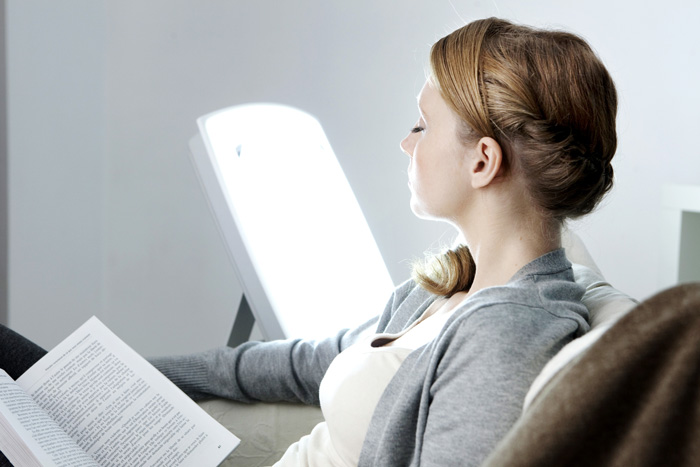Seasonal Affective Disorder (SAD) often has many consequences for people during the dark and cold days of winter.
For a long time, medical professionals didn’t think that SAD really affected anyone; and that people who complained of feeling blue, lethargic, and generally uninterested in life during certain times of the year didn’t have a problem. Now, researchers have a much better understanding of SAD—also known as winter or seasonal depression—and provide a number of remedies to help people with it.
People who experience a winter pattern of this disorder often notice changes in mood, sleep and eating habits, weight, and concentration. The medical community indicates the probability of SAD increases if you:
- Experience the above symptoms between September and March for at least two consecutive years, but feel better with the onset of spring
- Feel as though you don’t have any energy
- Have a lack of interest in socializing, preferring to “hunker down” or “hibernate” instead
- Notice that you have a larger appetite, especially for simple carbohydrates like rice, potatoes, and bread
- Sleep a lot more than usual
- Feel a lot more depressed or anxious
Surprisingly, there’s also a summer SAD. While rarer than winter SAD, it’s worth mentioning so you can talk with a medical care provider if you’ve noticed the following symptoms:
- You notice you’re more agitated and restless April through August, but calm down during fall and winter.
- Your sleep is disrupted by seasonal insomnia.
- You have a poor appetite and suffer weight loss as a result.
Who’s more likely to develop winter SAD? The National Institute for Mental Health (NIMH) identifies the following risk factors:
- You’re female.
- You’re between the ages of 15 and 55.
- You have an existing diagnosis of bipolar disorder or depression.
- You have a close biological relative who has or had depression, SAD, or bipolar disorder.
- You don’t live near the equator or have the opportunity to visit sunny places during winter.
If you’re in recovery and have some of the symptoms and risk factors listed above, you might have SAD. Now would be a good time to talk with your treatment counselor about the possibility of making adjustments in your continuum of care plan to provide additional support to avoid relapse.
It’s only since the 1980s or so that researchers lent credence to seasonal affective disorder, and it’s still necessary to have a health care professional provide a physical exam, psychological evaluation, and maybe even lab tests to confirm you don’t have an underlying medical condition. For example, two common health issues may be hypothyroidism, which presents many of the same symptoms as winter SAD; or hyperthyroidism, commonly associated with similar symptoms to summer SAD.
Why SAD Affects Your Mood
Winter depression can be caused by many factors, but NIMH reports the following three are typically found in people with winter SAD:
- Not enough vitamin D. The medical community refers to vitamin D as the “sunshine hormone” because your body requires sunlight to produce it. Vitamin D deficiency is a frequent cause in weight gain and depression, as well as potentially more serious health conditions.
- Trouble regulating serotonin. Serotonin, produced by your body’s nerve cells, is a natural mood stabilizer. Because vitamin D improves serotonin, this may be one reason why a lack of sunlight during the winter months often makes some people more depressed and anxious. Additional research indicates that other individuals may have trouble with the serotonin transporter protein, resulting in less of this vital chemical in the brain.
- Too much melatonin. Melatonin helps regular sleep patterns. You may have heard of people using a melatonin supplement if they frequently travel overseas and need to overcome jet lag. Shortened days during winter increase the body’s natural melatonin production, and this often wreaks havoc on circadian rhythms.
Possible Remedies for SAD
Here are some recommended solutions for coping with SAD.
- Exercise more often. One of the best ways to stimulate your natural production of serotonin and improve your outlook is to have a regular exercise routine. It’s even better if you can bundle up and tolerate the cold for just a little while to get outside. There are many studies regarding the positive effects of communing with nature, including decreased pain, enhanced calm, and reduced depression.
- Take a vitamin D3 supplement. More than likely, if you live in the Northern Hemisphere during winter, the South Pole is tilted more toward the sun, so you won’t have the opportunity to expose your bare skin to helpful ultraviolet B (UVB) rays like you do during summer. Few foods provide enough vitamin D, but preliminary research indicates a D3 supplement is more effective for stimulating the body’s vitamin D production than D2.
- Use light therapy. Specialized light boxes continue to provide an essential sunlight boost and help regulate your internal clock. These light sources are recommended for a number of reasons, including dawn simulation that gradually helps people wake up; or bright light treatment, which requires individuals to sit directly by the light box for up to an hour.
- Return to cognitive therapy. If you’ve completed an inpatient rehabilitation program for addiction, you were likely involved in cognitive therapy. A skilled therapist can introduce techniques many people find helpful for dealing with SAD, such as expanding pleasurable activities, better negative thought replacement, and using other coping skills, such as meditation, mindfulness, or prayer.
Turn to Willingway For Help
To help you deal with the SAD symptom of hibernation, tap into peer recovery meetings and activities so you can stay mindful of your sobriety. For example, Willingway offers a number of Continuing Care Community Groups that provide sociable opportunities that allow you to participate as much or as little as you like. The simple act of going once a week or more may be just the support you need to maintain awareness of the disorder and the ability to control your reaction to it.

